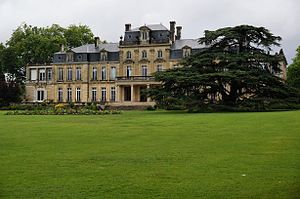Mérignac
|
Mérignac Merinhac |
||
|---|---|---|

|
|
|
| region | Nouvelle-Aquitaine | |
| Department | Gironde | |
| Arrondissement | Bordeaux | |
| Canton |
Mérignac-1 (main town) Mérignac-2 (main town) |
|
| Community association | Bordeaux metropolis | |
| Coordinates | 44 ° 51 ′ N , 0 ° 39 ′ W | |
| height | 12-53 m | |
| surface | 48.17 km 2 | |
| Residents | 70,105 (January 1, 2017) | |
| Population density | 1,455 inhabitants / km 2 | |
| Post Code | 33700 | |
| INSEE code | 33281 | |
| Website | www.merignac.com | |
 Bourran Castle |
||
Mérignac ( Occitan : Merinhac ) is a municipality in the French region of Nouvelle-Aquitaine .
geography
The city is a western suburb of Bordeaux . It is located in the Arrondissement of Bordeaux and forms two separate cantons, Canton Mérignac-1 and Canton Mérignac-2 . Mérignac has 70,105 inhabitants (as of January 1, 2017), making it the second largest city in the Gironde department .
Recent history
The German occupiers use the Fort du Hâ as a prison for political opponents, including Édouard Daladier and Georges Mandel . In a dépendance, called "Le camp de Pichey Beaudésert", mainly Sinti and Roma were held prisoner for racial reasons, and from July 1942 also Jews, most of whom were deported to the German death camps in the east. Since 1985 only a marble stele reminds of this camp.
Population development
| year | 1962 | 1968 | 1975 | 1982 | 1990 | 1999 | 2006 | 2017 |
| Residents | 32,355 | 45,951 | 50,652 | 51,306 | 57.273 | 61.992 | 65,469 | 70.105 |
| Sources: Cassini and INSEE | ||||||||
Attractions
The landscape park around Bourran Castle - itself a cultural monument - is an English landscape garden, now a bit overgrown and impaired by fixtures, but is still worth seeing.
See also: List of the Monuments historiques in Mérignac
Infrastructure
In the district Merignac which is Bordeaux-Merignac Airport . The community is served by bus lines and tram line A of the TBC in the direction of Bordeaux.
Town twinning
There are international communal ties too
- Vilanova i la Geltrú , Spain
- Kaolack , Senegal
- Saint.Laurent , Canada
Viticulture
Mérignac is a wine-growing town in the Graves wine-growing region and belongs to the Pessac-Léognan appellation .
Personalities
- Jean-Pierre Rivière (1929–1995), composer
- Roger Bielle (born 1928), wrestler
literature
- Maurice Ferrus: Un château historique. Le fort you Hâ. Feret et fils, Bordeaux 1922.
- M.-R. Bordes: Quartier allemand. La vie au fort du Hâ sous l'occupation. Éditions Bière, Bordeaux 1945.
- Jean-Jacques Déogracias: Le fabuleux destin du fort du Hâ. = Le fort du Hâ de Bordeaux. Les Dossiers d'Aquitaine, Bordeaux 2006, ISBN 2-84622-128-6 .
- Peter Gaida: Camps de travail sous Vichy. Les "Groupes des Travailleurs Etrangers" (GTE) en France et en Afrique du Nord 1940–1944. ANRT - Atelier national de reproduction des thèses, Villeneuve d'Ascq 2009, ISBN 978-2-7295-8330-9 ( Also : Bremen, Universität, Dissertation und Université, Paris 1 Panthéon-Sorbonne, Dissertation, 2009; summary in French, German and English language).
- Yvette Sémard: En souvenir de l'avenir. Au jour le jour dans les camps de Vichy (1942–1944). La Petite Roquette, les camps des Tourelles, d'Aincourt, de Gaillon, de La Lande et de Mérignac. Préface de Gilles Perrault . L'Arbre Verdoyant, Montreuil, 1991, ISBN 2-86718-022-3 .
- Le Patrimoine des Communes de la Gironde. Flohic Éditions, Volume 2, Paris 2001, ISBN 2-84234-125-2 , pp. 961-966.
Web links
Individual evidence
- ↑ Jean-Jacques Déogracias: Le fort du Hâ de Bordeaux. 2006, p. 88.
- ↑ sudouest.com: Procès Papon: les archives. ( Memento of the original from September 1, 2007 in the Internet Archive ) Info: The archive link was inserted automatically and has not yet been checked. Please check the original and archive link according to the instructions and then remove this notice.
- ↑ 459 Jews alone in 1942, this number is only for the over the transit camp Drancy deported
- ^ Mérignac: Relations Internationales
- ↑ From here, prisoners were transferred to the Voves prison camp , unless they were deported directly to the German death camps.


